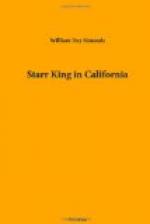King also planned, when leisure should be afforded him, a work in philosophy. Something of permanent value to all thinkers and students. One needs but to read King’s lecture on “Socrates” to understand how rich and valuable such a work would have been. Indeed, here are paragraphs that could have been written only by one of philosophic mood and habit of mind. How much of modern “New Thought Philosophy” is expressed in the following:
“Few acknowledge that thoughts are as substantial as things, that a feeling is as real as a paving stone, that the soul is a congeries of actual forces as truly as the body is, that a moral principle is as persistent and fatal a thing as a chemical agent, and that, in the deeps of the mind and of society, laws are at work as constant and stern as those which spin the planets and heave the sea and poise the firmaments.”
Accepting as the ground work of his philosophy such principles as these King tells us that “Socrates came to the conclusion that the stone which his chisel chipped was less substantial than the soul in every human form: and that the beauty which his cunning carved into the block was less charming and permanent than the beauty of truth, temperance, and holiness, which faith and culture could leave upon the invisible essence of man. He therefore resolved to abandon the lower for the higher art of Sculpture, and instead of being an artist in marble to be a fashioner of men.”
King’s aptness for historical and philosophical generalization is quite evident as we read:
“Socrates was the father of a new method of study. His thoughts were the seed corn of systems. His pupils were the teachers of centuries. Each bump of his brain was the nucleus of a philosophical school. Hardly had he left the world, than the strong and simple light he shed was scattered in various hues by the prismatic minds that had surrounded him or that succeeded him; and in almost every case, — as so often happens when the strands of the solar beam are brilliantly dishevelled, — the actinic ray was lost.”
In all our reading we have never met a description of the Grecian philosopher so complete and accurate as one brief phrase in the lecture from which these excerpts are taken, “Socrates, the slouchy ambassador of reason.” Or what could be truer of Socrates and Plato than to say that “Arm in arm, the stately duke and the democrat of philosophy walk down the lists of fame?”
Read and re-read the closing paragraph of King’s “Socrates” impresses the thoughtful mind more and more by its depth and beauty, and we ask, — what might not this man in his full maturity and in scholarly leisure have contributed to enrich the philosophy of our time?
“Down the River of Life, by its Athenian banks, he had floated upon his raft of reason serene, in cloudy as in smiling weather, for seventy years. And now the night is rushing down, and he has reached the mouth of the stream, and the great ocean is before him, dim heaving in the dusk. But he betrays no fear. There is land ahead, he thought; eternal continents there are, that rise in constant light beyond the gloom. He trusted still in the raft his soul had built, and with a brave farewell to the few true friends who stood by him on the shore he put out into the darkness, a moral Columbus, trusting in his haven on the faith of an idea.”




